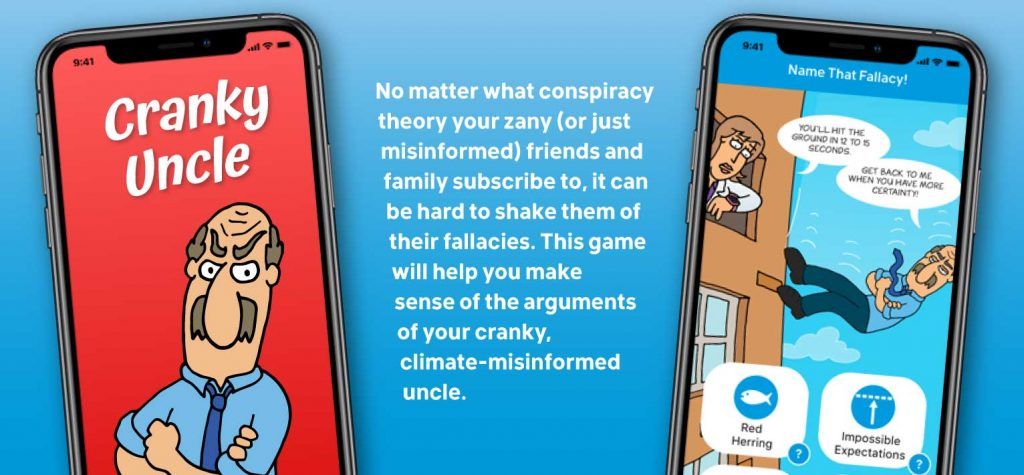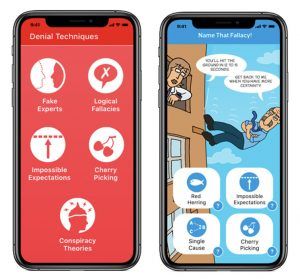Cranky Uncle: The smartphone game designed to fight climate denial
By John Cook | December 4, 2019
 Image courtesy of John Cook/Cranky Uncle
Image courtesy of John Cook/Cranky Uncle
How can the average person on the street—who is not a climate scientist, and more than likely has never met a climate scientist—readily discern the facts of science from the seemingly reasonable arguments of nonfactual climate denialism? Amid the constant bombardment of Tweets, Facebook ads, and sophisticated misinformation campaigns from armies of paid trolls, how can the public tell what is real scientific information from clever attempts to mislead?
Some collaborators and I have developed a smartphone application that uses the latest findings in a branch of psychological research called inoculation theory to offer a possible solution to climate misinformation.
The underlying premise behind the game is straightforward, even if the execution is more complicated: Just as being exposed to a weak form of a disease builds immunity against the real disease, being exposed to a weak form of misinformation can build resistance, so people are less influenced by actual misinformation.
In the case of the Cranky Uncle game, the climate change misinformation is delivered in a weakened form by explaining the fallacies that climate change deniers regularly use to distort the facts. Once people understand the techniques used to mislead them, they are less vulnerable to being misled.
Think about it: If you’re going to spot someone cheating at cards, it helps if you first learn some of the common strategies of cheaters—in other words, if you learn how to cheat.
To help do this, a Cranky Uncle cartoon character acts as a mentor. (Think of the Paul Newman character in the movie The Color of Money—the jaded old player explaining the secrets of the art of pool hustling and manipulation to a young Tom Cruise.)
The Cranky Uncle character explains in narrative form some of the tricks used to dismiss climate science. He goes over 16 of the most common techniques of science denial, such as the use of fake experts, logical fallacies, impossible expectations, and cherry-picking of data—to name just a handful.

The overall idea here is to engage students, using narrative, character, humor, and interactive gameplay to explain the techniques of denial and sophistry—the use of reasoning or argument that sounds correct at first glance but is actually false—and consequently build resilience against misinformation. The game draws upon a decade of my research into the psychology of misinformation, including experiments into inoculation and the developing of critical thinking that deconstructs climate misinformation.
By doing so, the game sidesteps one of the formidable stumbling blocks of human psychology: Our brains are hardwired to rely on instinctive, quick thinking rather than slow, reasoned thinking. Resilience against misinformation involves critical thinking, which requires cognitive effort.
Because Cranky Uncle gets players to practice their critical thinking skills and learn climate literacy in the form of an interactive game, it is more likely to engage and educate its player/students. And being a game, it can be readily distributed on a national scale—a key component to any effort at wide distribution.
Using games as teaching tools offers other benefits as well, such as interactive exercises, points systems, leveling up, and player-to-player contests that lend themselves to repetitive practice. The regular task of identifying denial techniques may hold the key to transforming an effortful, slow-thinking task to a more instinctive, automatic activity. Games possess the potential to turn critical thinking into muscle memory.
In addition, the Cranky Uncle game uses a critical thinking technique known as parallel argumentation. This involves taking the flawed logic in misinformation and transplanting it into an absurd situation to make the fallacy more obvious. (See illustration below.) It turns out that cartoons are an excellent delivery mechanism for parallel arguments.

The next stage in this project is developing a native app on iPhone and Android. To achieve this, I’ve launched a crowdfunding campaign this week to fund development of the game, which will be distributed for free on a nonprofit basis. The synthesis of art, science, and technology in the Cranky Uncle game lends itself to the crowdfunding approach. For example, one reward we’re offering for the first 97 “Cameo” donors is getting drawn as a cartoon character in the actual game. Why only 97 cameos? I have to draw each and every person!
One final note as we launch our crowdfunding campaign: Misinformation spread via social media is a plague infecting the entire community. So it is appropriate that community-based solutions—such as social games—be used to counter and repair the damage by inoculating readers.
Together, we make the world safer.
The Bulletin elevates expert voices above the noise. But as an independent nonprofit organization, our operations depend on the support of readers like you. Help us continue to deliver quality journalism that holds leaders accountable. Your support of our work at any level is important. In return, we promise our coverage will be understandable, influential, vigilant, solution-oriented, and fair-minded. Together we can make a difference.














